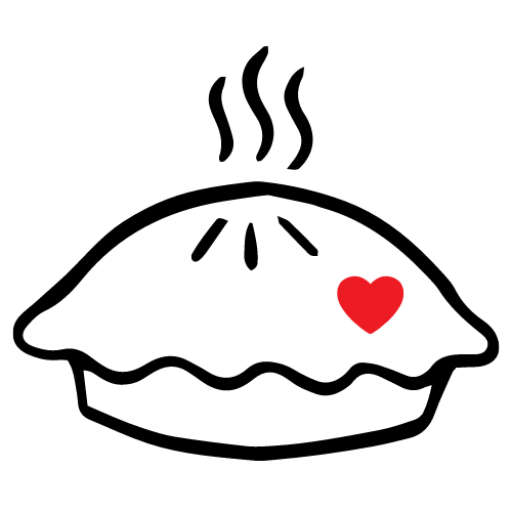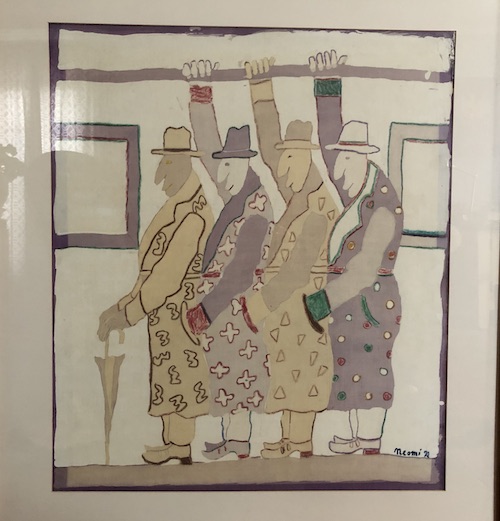The framed picture of four guys dressed in purple caught my dad’s eye. So he bought it for me. Those quirky, mysterious guys lived in my attic for years. But now, I keep them in view to remind me of what’s been true all along.
“I forgot one of your Christmas gifts,” my dad said one February, handing me the big, glass-framed picture. Duct tape held one of its corners together.
Four identical, pastel-drawn men stand in a line like nesting spoons. Facing the frame’s left edge, they all wear plain expressions, fedora hats and long, patterned overcoats of beige and dusky violet.
Adult quadruplets? Police lineup?
Dad spotted my puzzled look and chuckled. “I saw it at a tag sale. You’ve been painting everything purple, so I just got it for you.”
“Oh, OK. Thanks.”
True. The walls of my home office were now a deep, luscious violet. So was the front door of my house and the window boxes on the porch. Immediately after separating from my ex-husband, I started painting. An earthy, wine color felt just right.
Maybe those four purple guys are riding the subway together.
They stand between two violet windows. Three men brace themselves by holding onto the man in front of him, and gripping an overhead cross bar. I bet they stay in precise sync just like the Temptations. No matter how their train sways and jolts around sweeping turns beneath some unknown city, they’ll move together.
Surprise Box
Now, their picture hangs against Oxford blue walls of my office, in a different house, above my dad’s empty chair. Nine years and much reflection later, it still is one of his strange gifts. But I’m closer to making sense of it.
A short history of our complicated relationship: My dad’s absence and abdication hurt me as child. He was volatile, but not violent. As a teen, I was collateral damage when his infidelity ended his second marriage. I raged over all he’d failed to provide as a father.
When I was 25, we reconciled and began to rebuild.
Once, when we were barely talking, he sent a big, old green watering can that had been my great-grandfather’s to Boston, where I lived in a studio apartment. I’d graduated from a college he didn’t approve of, in a ceremony he was not invited to and stuck around that summer in a city he’d never seen.
I didn’t have a single plant, so I set aside the watering can. The next year, as a transplant to the Maine coast, I planted my first garden and every year I water with that chipped green can — useful after all.
Perhaps my dad was prescient. He could also be forgetful. Later, when we were talking and he regularly visited me, he gave me a heavy-duty tool bag with lots of outside pockets for several Christmases in a row. He would remember I’d lost one just like it, but not that he’d replaced it the year before.
Surely, I’m over-thinking it. Dad, mostly, was impulsive. If he spotted something that sparked a thought of me, and had enough cash in his pocket, he bought it.
Often, he didn’t understand why he did things any more than the rest of us understood.
Riding with Dad
Even when I was a toddler and too young to know anything about leather or gasoline, cigarettes and coffee, whenever I climbed into the front seat of my Dad’s car their blended scent flooded my nose.
On special occasions, a dash of Old Spice, too.
That mix of scents would instantly trigger my adoration, longing, and a sense of adventure — or trouble — just around the corner. The memory of that smell is tangled with the sound of his voice and chuckle. Out of habit, I still roll my eyes and shake my head.
My dad, David Lee Duchene, relished driving. He loved cars and he loved to drive fast. Perhaps he felt the most at home on the road. He embraced any excuse to dramatically downshift, force the gas pedal to the floor and awaken an engine’s power.
If he was driving us on the freeway and approaching a slower car, which happened often, he’d drive even faster. His eyes grew intense and he’d set his jaw as he unleashed the engine. Once he reached the clear sailing of the fast lane, his whole body sighed.
For my dad, the road was a happy place, where he enjoyed the thrill ride on the edge of control. A fast drive to anywhere was temporary escape, perhaps from an argument at home. He was often, I suspect, frustrated, overwhelmed and bewildered about life and how to hold onto a marriage or long-term commitment.
Along with the cars and fast driving, he loved women.
He’d made a family with my mom, his first wife. After their divorce, he married and had a daughter with his second wife, my stepmom. After their divorce, Stephanie became his long-time girlfriend and partner of 25 years.
Over the decades, he’d cheated on all of us.
Fading In and Out
My longing and adoration for my dad — despite the pain he’d caused — defines our story. He was there. Kind of. Then gone again. Back. Then gone.
Every fade-out was a fresh gut-punch of grief, a new layer of loss.
My story is of a child longing for a parent, an unfortunately all-too-ordinary story. I got lucky. I grew up with an extraordinarily capable mom who fulfilled the caretaking and financial jobs of two parents.
I’ve poured a lot, perhaps too much, time and energy into making sense and meaning of my dad and our story.
Many people, possibly some reading now, have a parent who was absent or fell short, or whose family-of-origin has broken. You may already know what it feels like to be white-hot furious with and love your parent in the same moment — or for years.
Ultimately, my dad and I made peace, and my family-of-origin found some peace. I hope telling the story inspires others to do what they can to make peace. I found it worth the effort.
A Family Man
My dad, like most of us, was a mix of good and bad qualities. He truly wanted to be a family man, I believe, but could not control his weaknesses and impulses.
Yet, David never moved away, and when I moved away he kept calling. He insisted on a visit whenever I came home. Our conversations were forced and awkward. I couldn’t figure out where to begin or even why I should bother.
One summer morning, when I was 20, I woke from a dream about my dad and started to write. Two hours later, memories of him fixing my bikes and cars filled 20-some, tear-stained, hand-written pages.
My heart started to soften. That morning offered a small light through a keyhole.
If our soul’s mission is to heal from our core wounds and life’s losses by finding a way to turn grief into grace, then that sleeping and waking dream of watching my dad fix my bike was a big first step.
My dad never let go. He never missed a chance to say “I love you” — even if he didn’t or couldn’t show it in ways I understood at the time.
I chose to hang on and tell him the truth — gently and harshly — however painful. Even when we were arguing, at least it was honest and real.
For those who’ve questioned if I’m letting him off too easy, it’s not my job to judge, nor to punish. For me, forgiving and healing that estrangement was a big step toward my own peace, and a whole, loving heart.
It was simply easier to love, than to stay angry.
He chose an incredible mom for me, who taught me to “turn those lemons into lemonade.” True, he provided plenty of lemons. Together, my parents gave me resilience and determination to stay steady on that lurching subway train as it speeds through underground passageways.
Our parents who fall short teach us just as much as our parents who reliably give us what we need. Lessons given by accident are lessons nonetheless.
My dad was a charming, funny, crude, flawed character who gave his daughter some good stories to share. Stories that may even help people find peace with their own families.
Discernment
My dad died in January 2013, six months and three weeks after an ER doctor told him he had pancreatic cancer. Gone. That final gut-punch knocked me over for awhile.
The last time we visited, we said I love you, over and over. And we argued.
I begged him to let go and end his pain. His chin jutted out in determination, as if he was willing an engine toward the fast lane.
He wasn’t going anywhere, he told me, despite that death’s grip on his body was already visible. Tough and stubborn, he fought until his last breath. Whatever peace he found was in the afterlife.
Waiting …
“Your dad’s been visiting me,” Stephanie told me months later. She had loved him unconditionally and took care of him for 25 years. He was visiting their home and in her dreams. Household items they’d discussed were out of place.
I waited for him to visit me in my dreams, but he never came. This triggered a fresh round — Even now, Dad, you choose a woman instead of your daughter! — but then I forgave him that, too, and it passed.
Who knows how all that really works, anyway?
Once in a blue moon I dream of him as my mind sifts memories. They don’t feel like visits.
Instead, perhaps he “haunts” me with our stories. We still talk. I just have to guess on his answers.
The fall of 2018 seemed right to commit to telling these stories.
I’d have to tell the truth — dark details and all — and throw my beloved, endearing and maddening dead father under the bus.
As I journaled every morning, I pitched him: Maybe telling our story could help people. I asked him for his blessing.
Then I “listened” for an answer.
What the hell do I care?! I’m dead!
Then: Do it. If it can help someone, go for it.
So I did. (I asked Stephanie, too, as his proxy. She gave an emphatic, green light.)
Here we are. This is how he still loves me, now that he’s not out there roaming around tag sales and sorting through his collection of odds and ends.
This is how we keep talking. With these stories that bounce around inside my head, demanding to be shared.
Like those purple guys, he’s a quirky character.
He bought the purple guys for me because he loved me. That simple.
He loved me even when I was a child and it was hard for me to feel it over his absence, when I was a teen raging at him, and when we could honestly talk as adults.
Even now, he loves me. I can feel it.
He gave me what he had. I’m my father’s daughter, using what I have, giving as best I can.


I know this story and yet it feels new- another detail or a more precise perspective. Always encouraged after reading!
Thank you Karen! I really, really appreciate that, because the goal is that readers are left feeling uplifted, and hopeful. ~ Love, Lisa
Lisa, my relationship with my father was not as complicated as yours, but clearly we had our ups and downs. Thanks for sharing your story.
Thank you, Camille, for reading my story and sharing your perspective. Every relationship is unique 🙂 Glad you’re here!